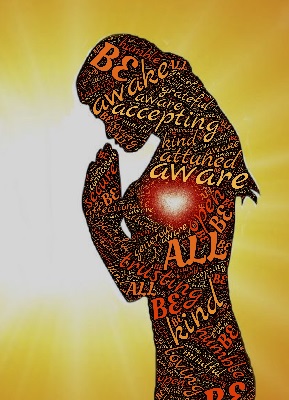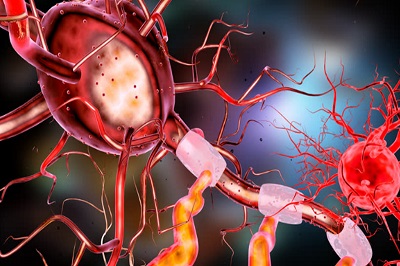The English language and Western sciences have a peculiar shortage of words for describing inner sensation. We talk about external senses like sight, hearing, touch, taste and smell, but what about the others?
You have a multitude of additional senses, with your internal ones being especially interesting, yet science currently has just one umbrella term for these — interoception.
Interoception is your ability to sense your internal milieu — the biochemical and nerve-mediated states and shifts in your physiology.
Proprioception is related, but that’s more about sensing your body’s position and motion.
This shortage of language leads to lack of discussion and, consequently, to a lack of awareness. The result can be a dramatic effect on the richness with which you experience life.

I’m not feeling it
A more familiar word for interoception is feeling.
We talk about feelings as synonymous with emotions — something psychological and seemingly ethereal. But feelings are more usefully understood as complexes of inner sensation replete with ancient intelligence.
For example, high heart rate + shallow breathing + stopped digestion + clammy skin + a specific pattern of muscular tension + extra blood sugar (etc) = fear.
This interoceptive complex we call fear may arise seconds before your brain consciously registers the poisonous snake in nearby grass. That’s enough time to save you. Very useful.
Much more subtle interoceptive patterns combine to produce all manner of insights and intuitions. I have a feeling John is interested in Jennifer. I don’t know why. There’s a vibe between those two.
We feel love, fear and intuition; we don’t think them.
The problem is that generations ago Western urban culture stopped encouraging children to utilise this deep, embodied intelligence. Worse, our culture has tended to deny, downplay, and even denigrate its existence.

This leaves us all feeling slightly odd.
At a certain level we know — we feel — that most of the richness of life is experienced at the level of body-mind-spirit, and through connection with others. Yet our brain, the only ‘educated’ part of us, tells us to ignore or diminish these signals, because he/she is Supreme Leader. All instincts are off. The deep signals that allow us to feel truly and profoundly alive get cast aside.
Many education systems serve to detach us in this way from the rich and ancient knowledge system that is our body. In its place a belief has been instilled that valid ‘thinking’ occurs only in the small area North of our eyebrows.
In fact, the idea of intelligence as a brain-localised function is so universal that it’s rarely even questioned. But what if that belief is just a cultural artefact rather than reality? What might you be missing?
Embodied intelligence
Your feelings — or interoceptive complexes — when you learn how to mine their subtleties, can inform you in the most profound ways about What Is and the appropriate action to take. They can give you guidance in each moment, and clarify your direction in life.
Interoception 101 is basic — it’s Am I hungry, thirsty, cold, hot, sweaty, in pain, safe or in danger?
At the other end of the scale a very interoceptively skilled Human Being — as we all once were — may feel (know) the right thing is to walk toward the deeper shadows and the fractionally cooler air creeping low over the ground, for a good chance of finding water.
The problem is that you have likely not been taught to feel into your inner being in this way, to extract its wisdom. You have not learned to integrate and respect the subtle sensations that inform What Is-ness and guide your optimal action.
You have probably been conditioned to think only with your brain, with its clunky chains of logic and memory banks that dredge up facts imparted by others rather than divined by you.

But your whole body is actually a moving nervous system.
Your brain is a very major player, but there are also sub-stations in the form of large groupings of neural tissue in your heart and enteric (gut) nervous systems.
Yes, your heart and gut contain neurons too — they ‘think’ and process information, very much like your brain. That’s how you know if your heart is in it, and whether you can feel it in your gut.
Nervous tissue extends from your brain to your body directly via cranial nerves such as the Vagus, and via your spinal cord. Nerves branch to every organ and muscle, and to the surface of every portion of your skin.
You have 145,000 kilometres of nerves in your body in total.
There are also billions of receptors on your individual cells communicating chemically and energetically, as well as a mass of living organisms in your gut (bacteria, viruses and other micro critters) all busily processing and transmitting mission-critical chemical and energetic information.
To lose or intentionally sever contact with this incredibly wise and complex body, relying only on your very limited if this, then that brain, is to live only half a life. Maybe less. It certainly won’t make you smart.
What does your gut tell you? Is your heart in it?
An additional problem is that if you ignore and therefore do not perceive much of what’s going on below your neck, this rich swirling pool of wisdom becomes unavailable to you. As a result, it may even appear to not exist.
A clue that you may have been doing this is if you find yourself often baffled or annoyed when other people discuss feelings, intuition, or their sense of things.
Or if your friends think you were separated at birth from Richard Dawkins, a popular cerebralist with an elite intellect, who appears to find others’ more wholistic perceptions utterly confounding.
Worth noting, too, is that most cultures, including Western cultures until recent generations, almost universally describe the centre of thinking as located either in their bellies or their heart area. Modern Western cultures are the odd ones out for both elevating and isolating the centre of thought to a small area under our skulls.
Intelligence as a field phenomenon
I am inclined to take it a step further and suggest that intelligence has field-like properties. Not only is it distributed through your physical being, but it also extends beyond it.
For example, the science of neurocardiology says that the electromagnetic field emanating from your heart can be detected three metres from your body, and that those signals give a good indication of your current emotional state.
Some physicists go deeper and describe consciousness as the likely substrate of reality — the cosmic creative essence itself, rather than an emergent property of matter.
Adding to this, in the past two years scientists reviewing the burgeoning mass of research on psi phenomena (such as perception of objects out of physical view) say the evidence for psi is now so strong that researchers should stop trying to demonstrate these phenomena and redirect their efforts to discovering the mechanisms. Perhaps they should look at the body, not just the brain.
I think it’s safe to propose that the most conservative position that reasonably remains is that intelligence and mind are at least distributed functions in the body.
Speculatively, this might bear some responsibility for the medical observation that consciousness continues for seconds, and sometimes many minutes, after a brain has flatlined and is considered inactive.
Others prefer a spiritual explanation for this. Perhaps a bridge between the two is to consider that we probably do not, as Western science has believed, think and perceive exclusively with our brains, but in some fashion with our entire nervous and biochemical network.
This might also shed light on cases in which extensive portions of a person’s brain are lost — or were never present to begin with due to severe hydrocephaly — yet they manage to function largely normally. Do we take a step closer to understanding this if we consider that intelligence might not be exclusive to one organ?
Sense and sense-ability — the ancient way of knowing
Sensation pre-dates all forms of verbal language and logic, both in your own development and in our evolution as a species. It’s an ancient way of knowing that is worthy of deep reverence.
For example, wild animals show incredible intelligence. Their attunement and responsiveness to environmental cues, without any ‘rational’ thinking, is extraordinary. Their responses are perfectly metered to meet their needs, informed by integrated multi-sensory data — a kind of omniception* — not logic.
Really, only a simple modern neocortex could imagine itself superior!
Slime Molds are single-celled organisms that organise themselves as large groups. Scientists have observed them making decisions about food sources to move towards, and dangers to escape. No brain, no nerves — just single cells. Yet they have been shown to learn, transmit memories to each other, and move as a coordinated and purposeful swarm.
If this isn’t the ultimate giveaway that foundational intelligence is humming along happily outside of the brain, I don’t know what is.
Interoceptive stock brokers make more money
This skill is also predictive of real, first world, quantifiable outcomes for our own species, in truly fascinating ways. Studies have shown this for example:
New York stock brokers who are best able to detect the activity of their own hearts — an interoceptive skill — are the ones who most successfully predict macro movements in the stock market. Stockbrokers who are unable to perceive their own hearts also fail to predict which way the stock market will move.
How to enhance your interoception
To build your own interoceptive skills, focus your efforts in three primary areas:

- Self-awareness. There are many ways to grow your self-awareness. Learn mindfulness or meditation, or work with a psychologist to train your ability to read, regulate and be guided by your feelings. The right kind of acting classes may also help this along.
- Movement. The wisdom contained in, and revealed by movement, requires a whole series of articles. Suffice it to say for now, practices like Yoga, Chi Gong, Tai Chi, Aikido and Authentic Movement are supreme for enhancing interoception. Dance is also a great starting point, with improvisational dance offering particularly profound self-development. To truly access the wisdom of your body you must move with consciousness.
- Connection — with nature and with other human beings. Go on wilderness retreats or just spend quiet time in nature. Practice conscious relationship techniques such as Authentic Relating, and use touch-based healing modalities as part of your healthcare.
My own favourite practice is a blend of meditation, yoga and Contact Improvisation dance. Just make sure that you are doing at least one thing from each category above.
Whatever you choose to do, I hope this article has been food for feeling! I’ll leave you to feel about it. 🙂
– – –
*Omniception is a word I made up (though I did later find one obscure case of it being used as a mathematical concept). It’s from the Latin omnia meaning whole/entire + perception. I use it to describe fully embodied intelligence — the integration of sensory-motor, emotional and biochemical signals with environmental information.
– – –
I may soon be offering fun practical workshops to help you get back into your body and experience the deep joy, wisdom and personal efficacy that comes from this. They will be based on the embodiment principles of Amy Cuddy, Contact Improvisation dance and Somatic Therapy, plus Yoga and Pranayama. No skills are required, just an enjoyment of movement and an interest in developing your emotional intelligence (EQ), which is an embodied skill set:
- Body Of Work — movement for inspiration and clear thinking
- Move It Or Lose It — the embodiment of calm
- Issues In Your Tissues — the Marie Kondo of embodiment skills — emotional tidying up and tossing whatever does not spark joy
- Moving On Up — movement for personal power and creativity
- Movers & Shakers — embodied leadership for executives, team leaders and parents
Message me if you would like to be included in relevant communications about these workshops, or keep an eye on the Facebook group Conscious Movement, Dance & Embodiment.
– – –
Beautifully written and insightful! I find myself continuously limited by language in expressing the inner sensations that I may be experiencing – and with that, a difficulty to fully express to others and create a relatable experience. For example, one word that comes immediately to mind is ‘love’. I feel this is barely adequate to express the complete range of internal and external emotion and connection that this sensation brings into my being.
I sometimes feel uncomfortable in attempting to communicate such inner sensations, for fear of judgement or polarising audiences, or perhaps not being able to communicate clearly. This is a challenge, however, I have taken on more and more lately, as I believe this skill may develop and that healthy, open discussion is so important to progress the language!